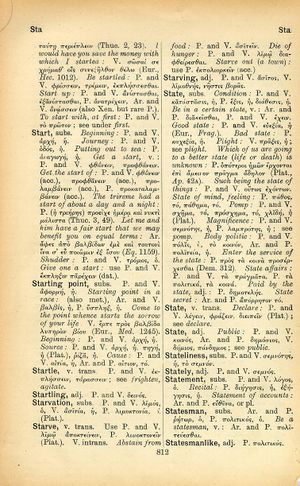state: Difference between revisions
Γίνωσκε σαυτὸν νουθετεῖν, ὅπου τρέχεις → Quo curras, animum advertere usque memineris → Mach mit Bedacht dir klar, an welchem Ort du läufst
(CSV5) |
m (Text replacement - "<b class="b2">Frag.</b>" to "''Frag.''") |
||
| Line 6: | Line 6: | ||
<b class="b2">Be in a certain state</b>, v.: Ar. and P. διακεῖσθαι, P. and V. ἔχειν. | <b class="b2">Be in a certain state</b>, v.: Ar. and P. διακεῖσθαι, P. and V. ἔχειν. | ||
<b class="b2">Good state</b>: P. and V. [[εὐεξία]], ἡ (Eur., | <b class="b2">Good state</b>: P. and V. [[εὐεξία]], ἡ (Eur., ''Frag.''). | ||
<b class="b2">Bad state</b>: P. [[καχεξία]], ἡ. | <b class="b2">Bad state</b>: P. [[καχεξία]], ἡ. | ||
Revision as of 11:01, 7 August 2017
English > Greek (Woodhouse)
subs.
Condition: P. and V. κατάστασις, ἡ, P. ἕξις, ἡ, διάθεσις, ἡ.
Be in a certain state, v.: Ar. and P. διακεῖσθαι, P. and V. ἔχειν.
Good state: P. and V. εὐεξία, ἡ (Eur., Frag.).
Bad state: P. καχεξία, ἡ.
Plight: V. πρᾶξις, ἡ; see plight.
Which of us are going to a better state (life or death) in unknown: P. ὁπότεροι ἡμῶν ἔρχονται ἐπὶ ἄμεινον πρᾶγμα ἄδηλον (Plat., Ap. 42A).
Such being the state of things: P. and V. οὕτως ἐχόντων.
State of mind, feeling: P. πάθος, τό, πάθημα, τό.
Pomp: P. and V. σχῆμα, τό, πρόσχημα, τό, χλιδή, ἡ (Plat.).
Magnificence: P. and V. σεμνότης, ἡ, P. λαμπρότης, ἡ; see pomp.
Body politic: P. and V. πόλις, ἡ, τὸ κοινόν, Ar. and P. πολιτεία, ἡ.
Enter the service of the state: P. πρὸς τὰ κοινὰ προσέρχεσθαι (Dem. 312).
State affairs: P. and V. τὰ πράγματα, P. τὰ πολιτικά, τὰ κοινά.
Paid by the state, adj.: P. δημοτελής.
State secret: Ar. and P. ἀπόρρητον, τό.
v. trans.
Declare: P. and V. λέγειν, φράζειν, διειπεῖν (Plat.); see declare.
adj.
Public: P. and V. κοινός, Ar. and P. δημόσιος, V. δήμιος, πάνδημος; see public.

